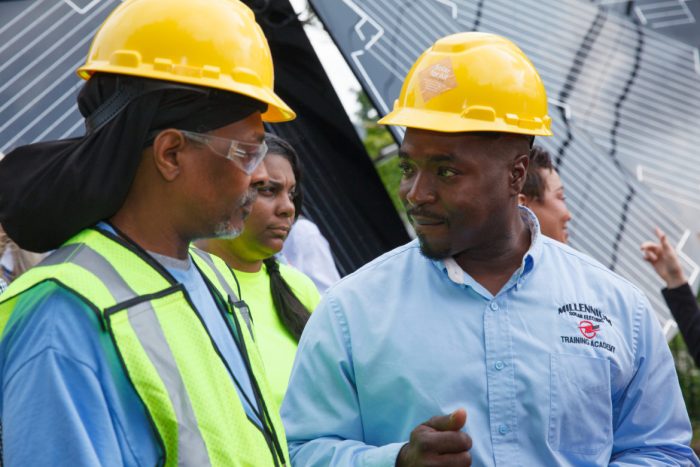In its September 2022 report on distributed renewable energy (DRE) jobs for emerging economies, the Power for All platform has said Nigeria has seen positive momentum in DRE product demand, which represents employment growth in the industry.
According to the Africa Mini-grid Development Association (AMDA), mini-grid companies not only create economic opportunities in communities but also provide direct employment across the whole value chain.
As of 2021, the number of people directly employed in Nigeria’s DRE industry, was 49,572, with 69% employed in the formal sector and 31% employed in the informal sector. As of September 2022, Nigerian women’s participation in the DRE industry is currently at 37%. By 2023, the industry is expected to create more than 76,000 jobs.
Recommended Reading: How to apply for INEC Adhoc staff recruitment
What Power for All is saying
Distributed renewable energy (DRE) systems are used to improve energy access to populations and communities in low-income and rural areas.
Nigeria’s DRE industry is creating formal and informal jobs and creating better chances for women’s participation.
People are working to install solar home systems (SHS), commercial and industrial (C&I) standalone systems, and mini-grids in communities across Nigeria.
Nigeria’s estimated 50,000 jobs in the DRE industry, nearly match the oil and gas industry, currently estimated at 65,000.
Although Nigeria’s DRE industry employment took a direct hit as a result of the Covid-19 pandemic and supply chain disruptions, the industry saw a strong recovery reaching pre-pandemic levels in 2021.
On the other hand, the International Labor Organization (ILO) and the International Renewable Energy Agency (IRENA), present an opposing view in their September 2022 report on renewable energy jobs trajectory. However, the report from Power for All is sub-Saharan Africa-specific, while the IRENA/ILO report is globally-focused, which makes the former report more local and detailed than the latter.
What IRENA AND ILO September 2022 report says about renewable energy jobs in Nigeria
The 2022 renewable energy jobs annual review, published by the ILO and the IRENA, rank Nigeria as having low renewable energy jobs creation due to poor energy access.
According to the report, more than 90 million people lack energy access in Nigeria, and although there is progress in renewable energy growth in the country, more work needs to be done. The report highlighted 90 million people in Nigeria as still lacking energy access as of 2022.
The joint report by IRENA and ILO says that renewable energy jobs globally, currently stand at 12.7 million with the United States, China, India, Brazil, and European Union countries, leading the pack. The number of renewable energy jobs is predicted to rise from today’s 12.7 million to 38.2 million in 2030. The report also says that energy efficiency, electric vehicles, power systems/flexibility, and hydrogen could employ another 74.2 million people by 2030.
Metrics of Africa’s mini-grid sector according to AMDA
Mini-grids, together with off-grid solar systems, are expected to be the least-cost solution for approximately 450 million people by 2030.
Between December 2019 and December 2021, the African mini-grid industry managed to increase the number of connections by 95% (from 40,700 to more than 78,000). The number of operational private mini-grids grew by 39%, from 288 sites in 2019 to 400 sites in 2021, resulting in over half a million people gaining access to electricity.
Non-equity funding for the mini-grid industry peaked in 2017 at USD 17.4 million but fell to USD 10 million in 2020. As of June 2020, only 13% of the USD 1.6 billion committed to the mini-grid industry had been deployed. Concessional capital is crucial to unlocking commercial investments (by de-risking these projects) while supporting the reduction of connection costs and tariffs.
Estimates reveal that national grids experience 75% more outages than mini-grids every month. AMDA’s data suggest that mini-grid systems have a service uptime of 99% for most of the reporting sites.
Africa’s mini-grid industry requires increased concessional funding, reduced capital flow barriers, enhanced regulatory frameworks and processes, reduced regulatory compliance timelines and costs, and a holistic approach when planning and funding electrification projects.
Bottomline
Nigeria’s DRE industry drives job creation and can play an important role in alleviating unemployment while ending energy poverty. Strong demand for DRE products is expected to boost job creation in the Nigerian DRE market over the coming years. Positive progress has been made in increasing women’s participation but more needs to be done especially in increasing the number of women in technical jobs.
